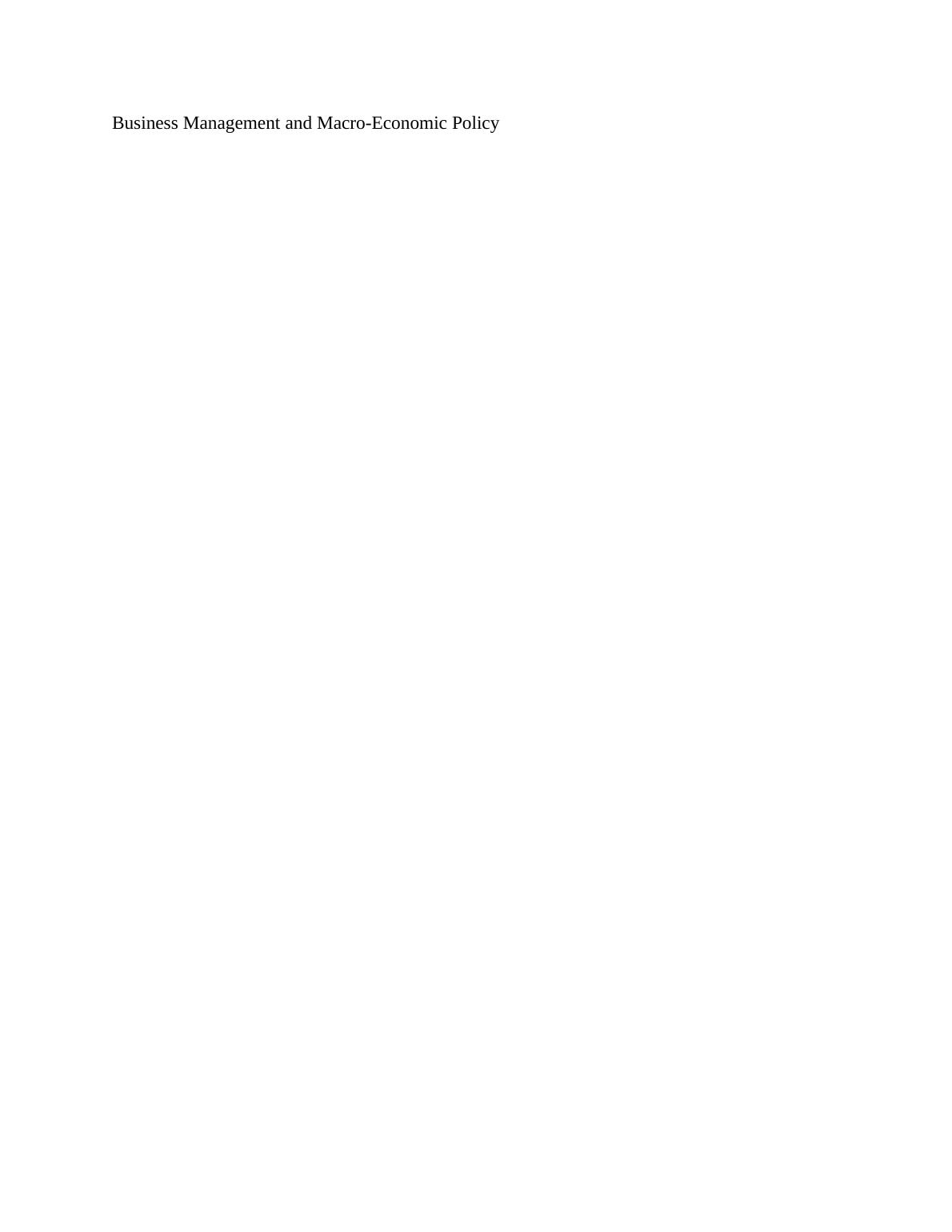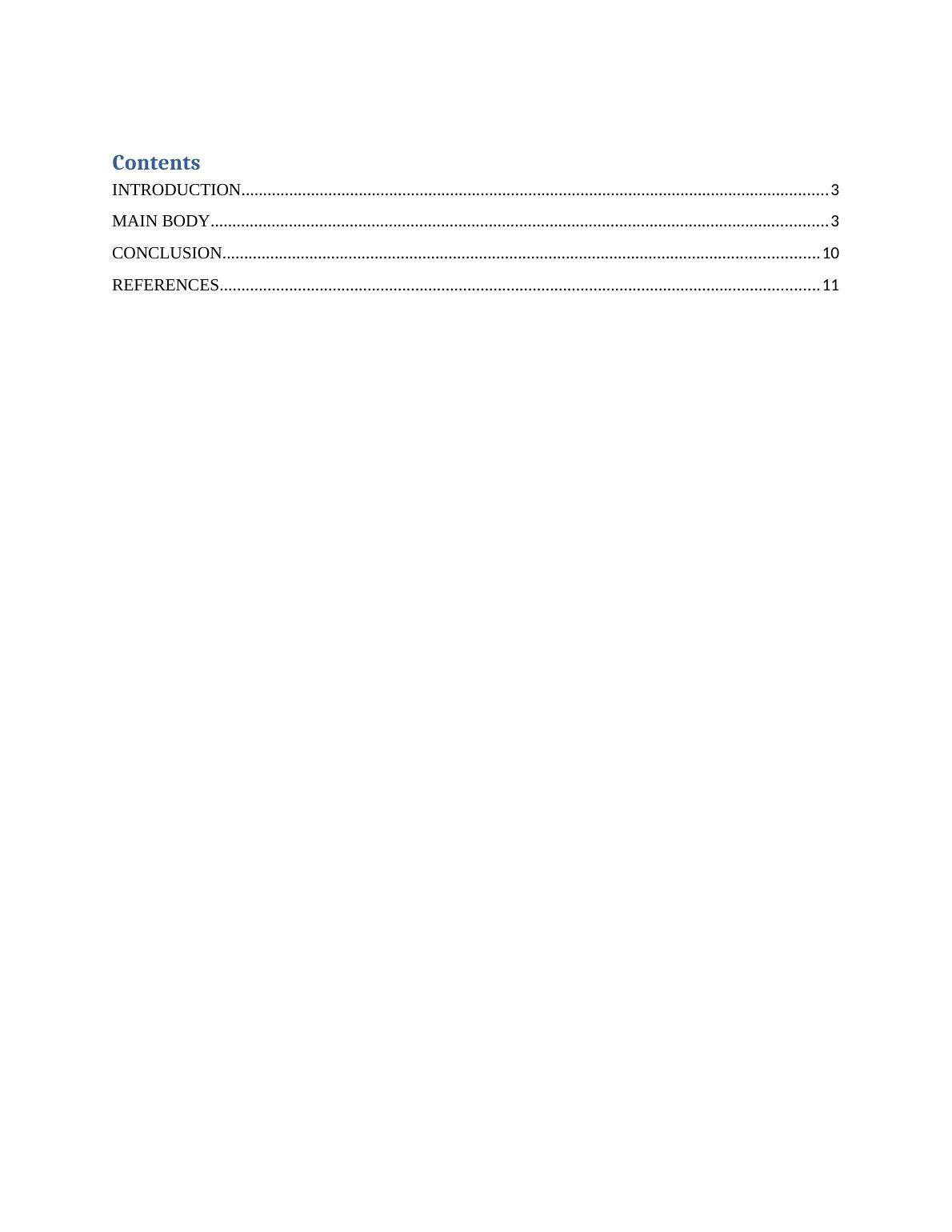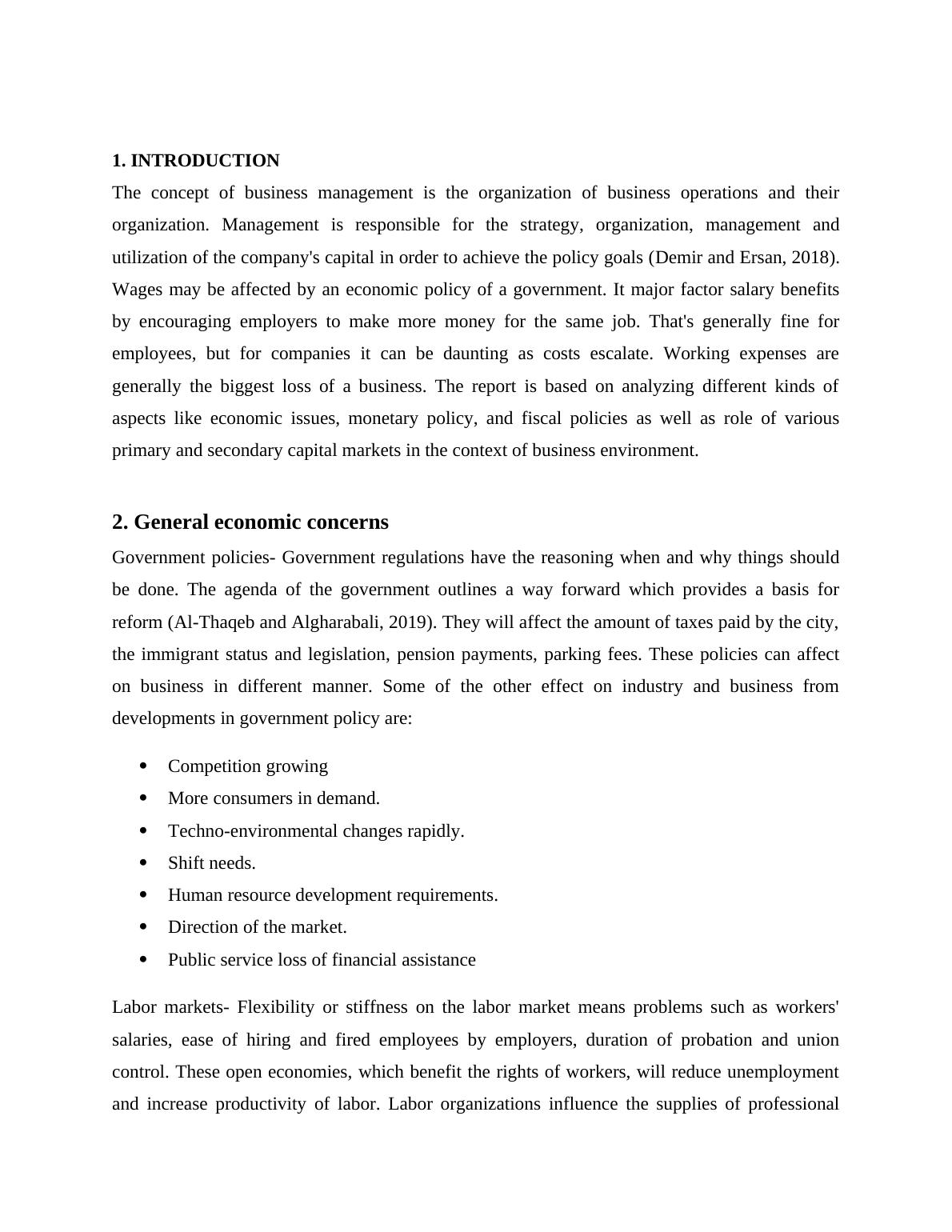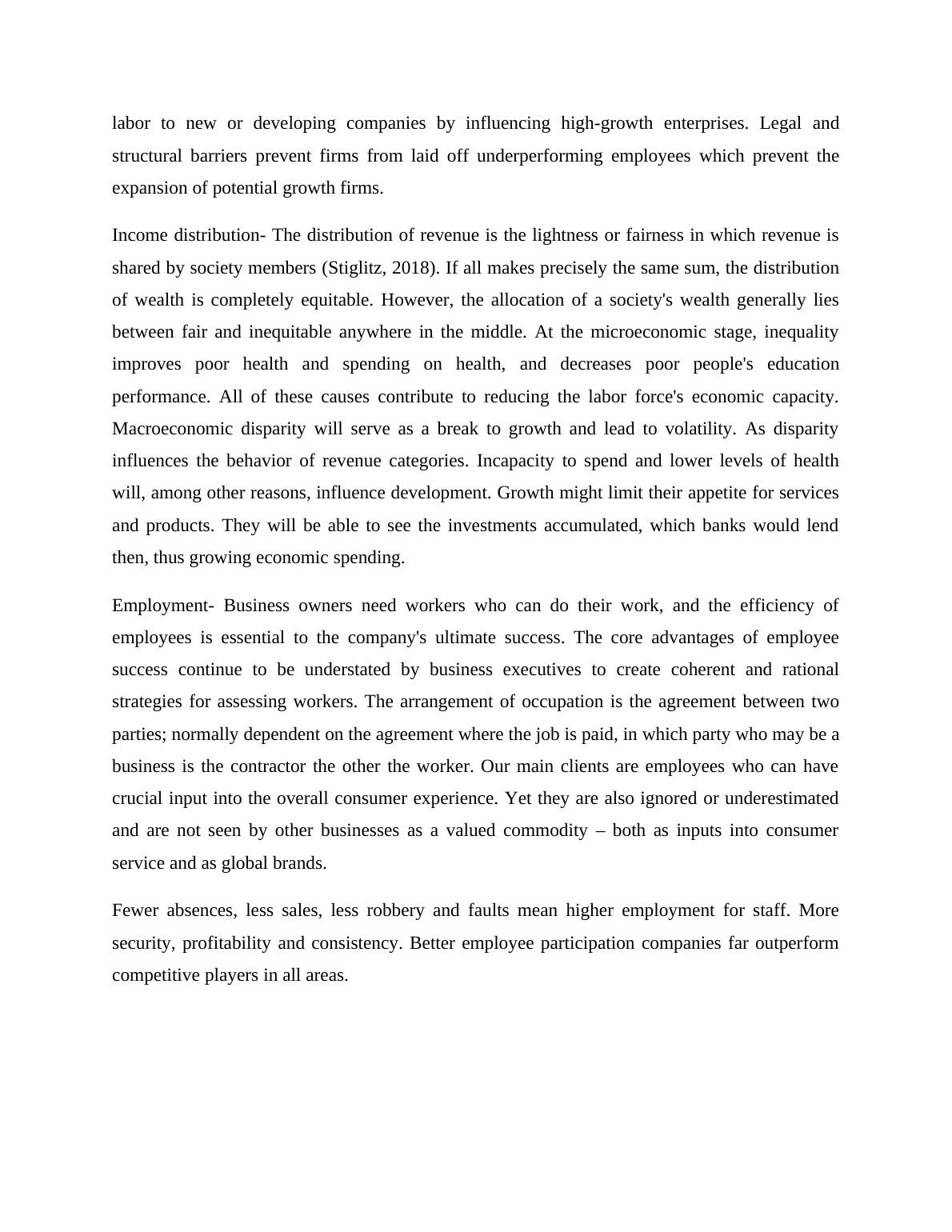Business Management and Macro-Economic Policy
Added on 2022-12-14
12 Pages3713 Words101 Views
Business Management and Macro-Economic Policy

Contents
INTRODUCTION.......................................................................................................................................3
MAIN BODY..............................................................................................................................................3
CONCLUSION.........................................................................................................................................10
REFERENCES..........................................................................................................................................11
INTRODUCTION.......................................................................................................................................3
MAIN BODY..............................................................................................................................................3
CONCLUSION.........................................................................................................................................10
REFERENCES..........................................................................................................................................11

1. INTRODUCTION
The concept of business management is the organization of business operations and their
organization. Management is responsible for the strategy, organization, management and
utilization of the company's capital in order to achieve the policy goals (Demir and Ersan, 2018).
Wages may be affected by an economic policy of a government. It major factor salary benefits
by encouraging employers to make more money for the same job. That's generally fine for
employees, but for companies it can be daunting as costs escalate. Working expenses are
generally the biggest loss of a business. The report is based on analyzing different kinds of
aspects like economic issues, monetary policy, and fiscal policies as well as role of various
primary and secondary capital markets in the context of business environment.
2. General economic concerns
Government policies- Government regulations have the reasoning when and why things should
be done. The agenda of the government outlines a way forward which provides a basis for
reform (Al-Thaqeb and Algharabali, 2019). They will affect the amount of taxes paid by the city,
the immigrant status and legislation, pension payments, parking fees. These policies can affect
on business in different manner. Some of the other effect on industry and business from
developments in government policy are:
Competition growing
More consumers in demand.
Techno-environmental changes rapidly.
Shift needs.
Human resource development requirements.
Direction of the market.
Public service loss of financial assistance
Labor markets- Flexibility or stiffness on the labor market means problems such as workers'
salaries, ease of hiring and fired employees by employers, duration of probation and union
control. These open economies, which benefit the rights of workers, will reduce unemployment
and increase productivity of labor. Labor organizations influence the supplies of professional
The concept of business management is the organization of business operations and their
organization. Management is responsible for the strategy, organization, management and
utilization of the company's capital in order to achieve the policy goals (Demir and Ersan, 2018).
Wages may be affected by an economic policy of a government. It major factor salary benefits
by encouraging employers to make more money for the same job. That's generally fine for
employees, but for companies it can be daunting as costs escalate. Working expenses are
generally the biggest loss of a business. The report is based on analyzing different kinds of
aspects like economic issues, monetary policy, and fiscal policies as well as role of various
primary and secondary capital markets in the context of business environment.
2. General economic concerns
Government policies- Government regulations have the reasoning when and why things should
be done. The agenda of the government outlines a way forward which provides a basis for
reform (Al-Thaqeb and Algharabali, 2019). They will affect the amount of taxes paid by the city,
the immigrant status and legislation, pension payments, parking fees. These policies can affect
on business in different manner. Some of the other effect on industry and business from
developments in government policy are:
Competition growing
More consumers in demand.
Techno-environmental changes rapidly.
Shift needs.
Human resource development requirements.
Direction of the market.
Public service loss of financial assistance
Labor markets- Flexibility or stiffness on the labor market means problems such as workers'
salaries, ease of hiring and fired employees by employers, duration of probation and union
control. These open economies, which benefit the rights of workers, will reduce unemployment
and increase productivity of labor. Labor organizations influence the supplies of professional

labor to new or developing companies by influencing high-growth enterprises. Legal and
structural barriers prevent firms from laid off underperforming employees which prevent the
expansion of potential growth firms.
Income distribution- The distribution of revenue is the lightness or fairness in which revenue is
shared by society members (Stiglitz, 2018). If all makes precisely the same sum, the distribution
of wealth is completely equitable. However, the allocation of a society's wealth generally lies
between fair and inequitable anywhere in the middle. At the microeconomic stage, inequality
improves poor health and spending on health, and decreases poor people's education
performance. All of these causes contribute to reducing the labor force's economic capacity.
Macroeconomic disparity will serve as a break to growth and lead to volatility. As disparity
influences the behavior of revenue categories. Incapacity to spend and lower levels of health
will, among other reasons, influence development. Growth might limit their appetite for services
and products. They will be able to see the investments accumulated, which banks would lend
then, thus growing economic spending.
Employment- Business owners need workers who can do their work, and the efficiency of
employees is essential to the company's ultimate success. The core advantages of employee
success continue to be understated by business executives to create coherent and rational
strategies for assessing workers. The arrangement of occupation is the agreement between two
parties; normally dependent on the agreement where the job is paid, in which party who may be a
business is the contractor the other the worker. Our main clients are employees who can have
crucial input into the overall consumer experience. Yet they are also ignored or underestimated
and are not seen by other businesses as a valued commodity – both as inputs into consumer
service and as global brands.
Fewer absences, less sales, less robbery and faults mean higher employment for staff. More
security, profitability and consistency. Better employee participation companies far outperform
competitive players in all areas.
structural barriers prevent firms from laid off underperforming employees which prevent the
expansion of potential growth firms.
Income distribution- The distribution of revenue is the lightness or fairness in which revenue is
shared by society members (Stiglitz, 2018). If all makes precisely the same sum, the distribution
of wealth is completely equitable. However, the allocation of a society's wealth generally lies
between fair and inequitable anywhere in the middle. At the microeconomic stage, inequality
improves poor health and spending on health, and decreases poor people's education
performance. All of these causes contribute to reducing the labor force's economic capacity.
Macroeconomic disparity will serve as a break to growth and lead to volatility. As disparity
influences the behavior of revenue categories. Incapacity to spend and lower levels of health
will, among other reasons, influence development. Growth might limit their appetite for services
and products. They will be able to see the investments accumulated, which banks would lend
then, thus growing economic spending.
Employment- Business owners need workers who can do their work, and the efficiency of
employees is essential to the company's ultimate success. The core advantages of employee
success continue to be understated by business executives to create coherent and rational
strategies for assessing workers. The arrangement of occupation is the agreement between two
parties; normally dependent on the agreement where the job is paid, in which party who may be a
business is the contractor the other the worker. Our main clients are employees who can have
crucial input into the overall consumer experience. Yet they are also ignored or underestimated
and are not seen by other businesses as a valued commodity – both as inputs into consumer
service and as global brands.
Fewer absences, less sales, less robbery and faults mean higher employment for staff. More
security, profitability and consistency. Better employee participation companies far outperform
competitive players in all areas.

End of preview
Want to access all the pages? Upload your documents or become a member.
Related Documents
Introduction to Economics Assessmentlg...
|5
|732
|18
Essay on Strategies Of Economics Developmentlg...
|11
|3685
|547
Inequality and Unequal Justice Research Paper 2022lg...
|4
|752
|22
Fiscal Policy and its Response to COVID-19 by Australian Governmentlg...
|7
|1984
|463
Determinants of household income in rural pakistanlg...
|7
|1871
|85
Impact of Covid-19 on UK's Economy and Government Policieslg...
|10
|2648
|344
